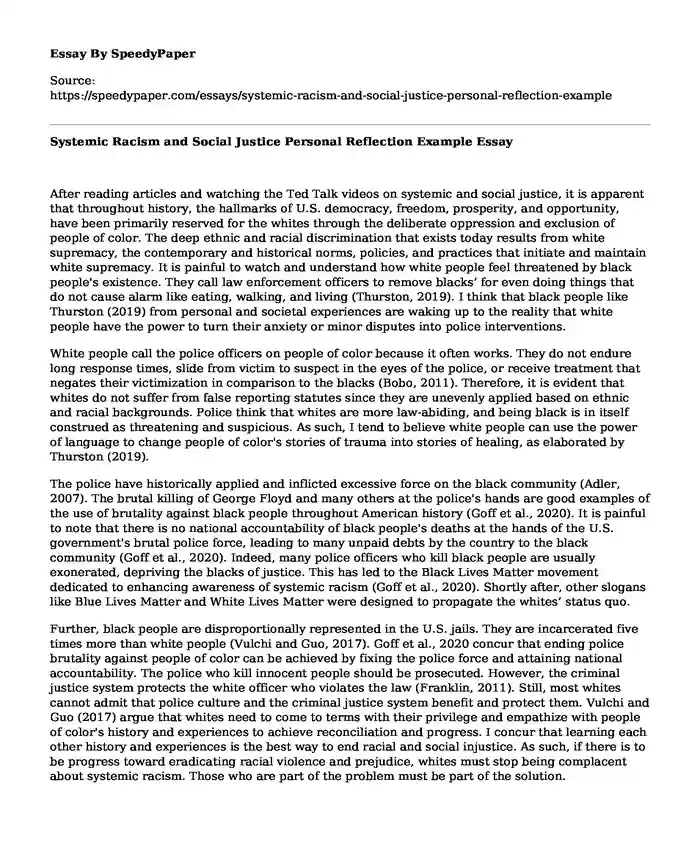
| Essay type: | Reflective essays |
| Categories: | Racism Personal experience Community Social justice |
| Pages: | 4 |
| Wordcount: | 927 words |
After reading articles and watching the Ted Talk videos on systemic and social justice, it is apparent that throughout history, the hallmarks of U.S. democracy, freedom, prosperity, and opportunity, have been primarily reserved for the whites through the deliberate oppression and exclusion of people of color. The deep ethnic and racial discrimination that exists today results from white supremacy, the contemporary and historical norms, policies, and practices that initiate and maintain white supremacy. It is painful to watch and understand how white people feel threatened by black people's existence. They call law enforcement officers to remove blacks’ for even doing things that do not cause alarm like eating, walking, and living (Thurston, 2019). I think that black people like Thurston (2019) from personal and societal experiences are waking up to the reality that white people have the power to turn their anxiety or minor disputes into police interventions.
White people call the police officers on people of color because it often works. They do not endure long response times, slide from victim to suspect in the eyes of the police, or receive treatment that negates their victimization in comparison to the blacks (Bobo, 2011). Therefore, it is evident that whites do not suffer from false reporting statutes since they are unevenly applied based on ethnic and racial backgrounds. Police think that whites are more law-abiding, and being black is in itself construed as threatening and suspicious. As such, I tend to believe white people can use the power of language to change people of color's stories of trauma into stories of healing, as elaborated by Thurston (2019).
The police have historically applied and inflicted excessive force on the black community (Adler, 2007). The brutal killing of George Floyd and many others at the police's hands are good examples of the use of brutality against black people throughout American history (Goff et al., 2020). It is painful to note that there is no national accountability of black people's deaths at the hands of the U.S. government's brutal police force, leading to many unpaid debts by the country to the black community (Goff et al., 2020). Indeed, many police officers who kill black people are usually exonerated, depriving the blacks of justice. This has led to the Black Lives Matter movement dedicated to enhancing awareness of systemic racism (Goff et al., 2020). Shortly after, other slogans like Blue Lives Matter and White Lives Matter were designed to propagate the whites’ status quo.
Further, black people are disproportionally represented in the U.S. jails. They are incarcerated five times more than white people (Vulchi and Guo, 2017). Goff et al., 2020 concur that ending police brutality against people of color can be achieved by fixing the police force and attaining national accountability. The police who kill innocent people should be prosecuted. However, the criminal justice system protects the white officer who violates the law (Franklin, 2011). Still, most whites cannot admit that police culture and the criminal justice system benefit and protect them. Vulchi and Guo (2017) argue that whites need to come to terms with their privilege and empathize with people of color's history and experiences to achieve reconciliation and progress. I concur that learning each other history and experiences is the best way to end racial and social injustice. As such, if there is to be progress toward eradicating racial violence and prejudice, whites must stop being complacent about systemic racism. Those who are part of the problem must be part of the solution.
There is a need for racial literacy to understand racial injustice. Americans should openly speak about racial realities and problems. They should understand their racial identity and how it interacts with other identities and how they identify with their racial development journey and social history. Vulchi and Guo (2017) advise that people should bridge the heart and mind gap to fight racism and social injustice. Now is the time to recognize the pain of racism and learn how unjust laws, biased policing, and systematic racism increase racial discrimination. Thus, learning personal stories and people's experiences of the complex racial realities will eliminate racial discrimination and injustice.
References
Adler, J. S. (2007). Shoot to kill: The use of deadly force by the Chicago police, 1875–1920. The Journal of Interdisciplinary History, 38(2), 233-254. https://doi.org/10.1162/jinh.2007.38.2.233
Bobo, L. D. (2011). Somewhere between Jim Crow & post-racialism: Reflections on the racial divide in America today. Daedalus, 140(2), 11-36. https://doi.org/10.1162/daed_a_00091
Franklin, J. H. (2011). The two worlds of race: A historical perspective. Daedalus, 140(1), 28-43. https://doi.org/10.1162/daed_a_00056
Goff, P. A., Robinson, R., King, B., & Romero, A. D. (2020). The path to ending systemic racism in the U.S. TED: Ideas worth spreading. https://www.ted.com/talks/dr_phillip_atiba_goff_rashad_robinson_dr_bernice_king_anthony_d_romero_the_path_to_ending_systemic_racism_in_the_us?utm_campaign=tedspread&utm_medium=referral&utm_source=tedcomshare
Thurston, B. (2019). How to deconstruct racism, one headline at a time. TED: Ideas worth spreading. https://www.ted.com/talks/baratunde_thurston_how_to_deconstruct_racism_one_headline_at_a_time?utm_campaign=tedspread&utm_medium=referral&utm_source=tedcomshare
Vulchi, P., & Guo, W. (2017). What it takes to be racially literate. TED: Ideas worth spreading. https://www.ted.com/talks/priya_vulchi_and_winona_guo_what_it_takes_to_be_racially_literate?utm_campaign=tedspread&utm_medium=referral&utm_source=tedcomshare
Cite this page
Systemic Racism and Social Justice Personal Reflection Example. (2024, Jan 08). Retrieved from https://speedypaper.net/essays/systemic-racism-and-social-justice-personal-reflection-example
Request Removal
If you are the original author of this essay and no longer wish to have it published on the SpeedyPaper website, please click below to request its removal:
- Life Changing Experience Essay Example
- Impacts of Immigration and Bill Clinton's Scandals in America
- The Use of Software in the Criminal Justice Systems, Free Essay
- Free Essay on the Rule Violations and Conflict of Interest at the Workplace
- Essay Sample on Representations of Appalachia
- Essay Sample on Cultural Change Among the San People of Africa
- Paper Example: The War on Drugs and Collateral Consequences
Popular categories




